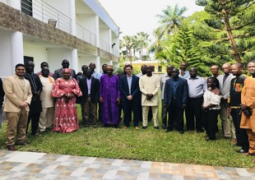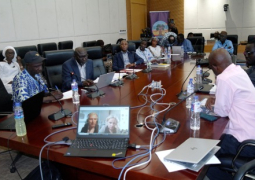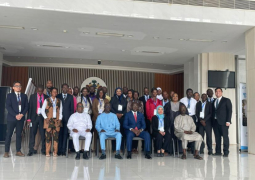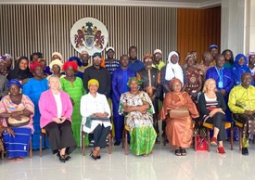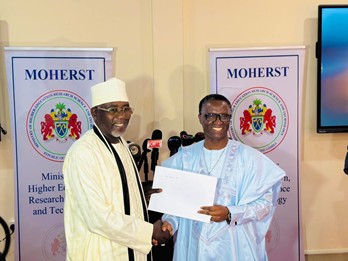
The strategy aims to create structured pathways for Madrassah and Majalis graduates to enter tertiary education, particularly in fields such as technical and vocational training, apprenticeships and STEM.
The Board is expected to lead reforms that expand access to learning and employment opportunities for learners from Islamic education backgrounds.
Members of the Board include Pa Samba Baldeh as chairperson, Essa Darboe of AMAfro, Associate Professor Abdul Khadre Sillah of the University of The Gambia, Fatou Janneh of MoHERST, Khalid Ahmed Drammeh of MoBSE, Saikou Barrow of MoBSE, Malamin Jagana of Imam Malik Islamic School, Aisah Tasif Gaye of YaDa Alieu School and Islamic scholar Imam Ousman Jah.
In his statement, Professor Gomez said the launch reaffirmed a national vision in which Madrassah learners are recognised, supported and empowered to contribute meaningfully to national socio-economic development. He said the government aims to uphold Islamic values while opening opportunities for innovation, skills development and national progress.
He noted that Madrassah schools have for decades played a central role in nurturing children, strengthening moral values and preserving religious identity but many of these learners continue to face limited access to mainstream TVET and higher education opportunities. He said the new Board will serve as the apex governance and oversight institution for the sector, providing policy guidance, regulating standards and supporting a structured and coherent integration process.
He explained that the Board is mandated to lead the implementation of the Gambia Madrassah Integration Strategy, supervise the Model Madrassah Pilot Project and support teacher training, curriculum alignment and assessment reforms. The Board will also promote sustainable financing options including the Rental Estate Waqf model and strengthen partnerships with Daaras, Majaalis and development partners.
Professor Gomez said the Board is expected to deliver a fully functional Model Madrassah Pilot Project, a harmonised curriculum that integrates STEM, TVET and entrepreneurship, and a structured teacher training and accreditation system. The Board is also expected to produce a feasibility study on the Waqf model, conduct community outreach, lead nationwide sensitisation and establish a strong monitoring and evaluation system.
Ambassador Jainaba Jagne, Permanent Secretary at MoHERST, said the Board will lead the implementation of a comprehensive national reform agenda. She outlined priorities such as aligning the Madrassah curriculum with national education standards including STEM, TVET, English literacy and entrepreneurship, and overseeing the modernisation of twelve selected Madrassahs with upgraded infrastructure, laboratories, libraries and TVET workshops. She also highlighted the need to establish standards for teacher training and professional development, strengthen governance and accountability systems and ensure that Madrassah graduates have clear entry pathways into tertiary education in line with Sustainable Development Goal Four, the African Union Agenda 2063 and The Gambia’s Recovery Focused National Development Plan running from 2023 to 2027.


